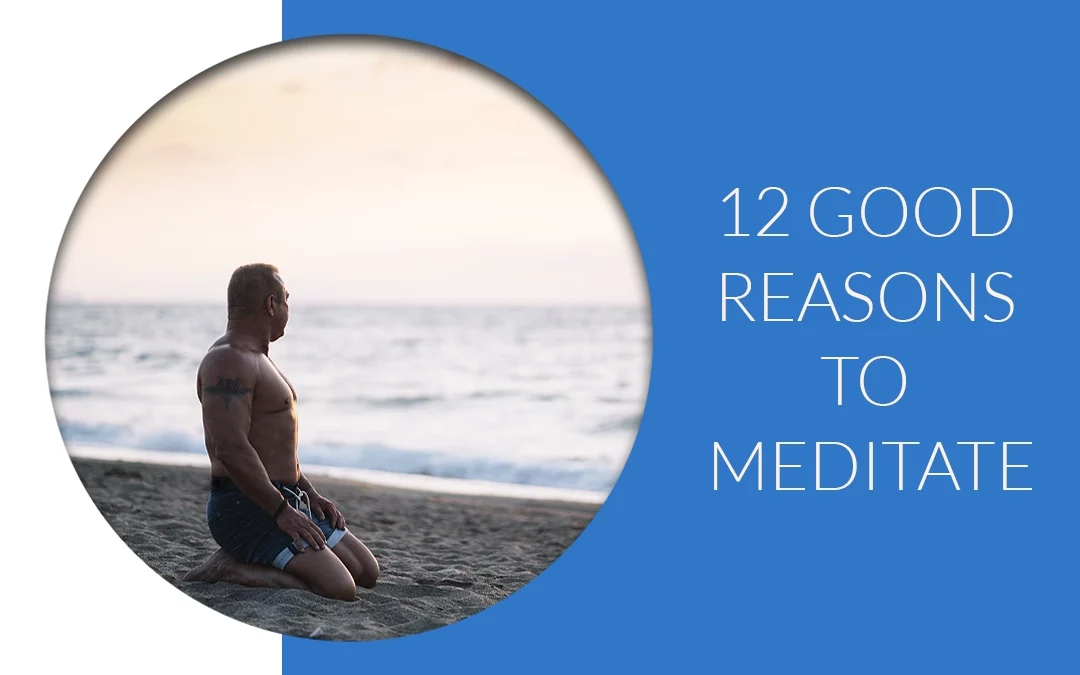12 Good Reasons for Meditation
Meditation offers far more than a few quiet moments — it’s a simple daily habit that can transform your mind, body, and outlook on life. From reducing stress and anxiety to improving focus, mood, and sleep, meditation has been shown in countless studies to boost overall well-being. With so many proven benefits, finding a little peace of mind each day is well worth a try.
At its core, meditation is the practice of training your mind to focus and redirect your thoughts. As its popularity grows, more people are discovering how this time-honored practice can improve their health, self-awareness, and emotional resilience.
You can use meditation to increase awareness of yourself and your surroundings, reduce stress, and enhance concentration. Many also use it to foster self-discipline, healthy sleep patterns, a positive mindset, and even greater pain tolerance.
Below are 12 evidence-based reasons to make meditation part of your daily routine.
- Reduces Stress
Stress reduction is one of the most common reasons people try meditation — and research shows it truly works.
When you’re stressed, your body releases the hormone cortisol, which can trigger inflammation and other harmful effects, such as poor sleep, fatigue, anxiety, and depression. In an eight-week study, mindfulness meditation was shown to reduce stress-related inflammation.
Meditation can also help relieve symptoms of stress-related conditions like irritable bowel syndrome, PTSD, and fibromyalgia.
- Controls Anxiety
By reducing stress, meditation naturally helps lower anxiety levels.
A meta-analysis of nearly 1,300 adults found that meditation significantly decreased anxiety — especially in those who experienced it most intensely. Studies show that just eight weeks of mindfulness meditation can ease symptoms of generalized anxiety disorder while improving coping skills and emotional resilience.
Even job-related anxiety may improve. In one study, employees who used a mindfulness app for eight weeks reported higher well-being and less work-related distress than those in a control group.
- Promotes Emotional Health
Specific forms of meditation can enhance self-image and create a more positive outlook on life.
In multiple reviews involving thousands of participants, mindfulness meditation was linked to reduced symptoms of depression and fewer negative thoughts. Research suggests that meditation lowers inflammatory chemicals called cytokines, which can otherwise affect mood and contribute to depression.
- Enhances Self-Awareness
Meditation helps you understand yourself better and become more mindful of how your thoughts shape your life.
Practices such as self-inquiry meditation are designed to enhance self-understanding and strengthen your relationships with others. As you become aware of self-defeating thought patterns, you can learn to redirect them into more constructive ones.
Studies show that meditation can improve confidence and social connection while reducing loneliness—even after just two weeks of practice.
- Lengthens Attention Span
Focused-attention meditation is like strength training for your mind.
Research shows that people who meditate regularly demonstrate improved concentration, accuracy, and mental endurance. One study found that even 13 minutes of daily meditation enhanced attention and memory after just eight weeks.
Meditation may also help reverse brain patterns associated with worrying and mind-wandering, helping you stay present longer.
- Reduces Age-Related Memory Loss
Improving focus and mental clarity can help keep your brain sharp.
Kirtan Kriya, a type of meditation combining chanting with repetitive finger movements, has been shown to improve memory and cognitive performance in older adults. Other studies reveal that regular meditation can enhance attention, memory, and mental quickness — even helping those with mild dementia or caregivers experiencing high stress.
- Generates Kindness and Compassion
Meditation can open your heart as well as your mind.
Loving-kindness meditation (Metta) teaches you to cultivate compassion first for yourself, then for others — even difficult people. A review of 22 studies found that Metta practice increased empathy and positive emotions over time.
These benefits grow with consistency: the more you practice loving-kindness meditation, the more warmth and connection you tend to feel toward yourself and others.
- Helps Overcome Addictions
Meditation builds self-control and awareness of what drives your behavior — two key elements in breaking dependencies.
Research has shown that meditation can help reduce cravings and emotional reactivity in people struggling with substance use or emotional eating. In one study, participants who practiced transcendental meditation reported lower stress, fewer alcohol cravings, and reduced alcohol use after three months.
- Improves Sleep Quality
Nearly half of all adults experience insomnia at some point, and meditation can help.
Mindfulness-based meditation programs have been found to improve sleep duration and quality compared with control groups. By calming racing thoughts and relaxing the body, meditation makes it easier to fall — and stay — asleep.
- Helps Control Pain
Your perception of pain is closely tied to your mental state, and meditation can shift that relationship.
Studies show that mindfulness meditation can reduce the intensity of pain and improve the quality of life for people with chronic conditions. A large meta-analysis involving over 3,500 participants found that meditators experienced less pain and handled discomfort more effectively than non-meditators.
- Lowers Blood Pressure
Meditation benefits physical health by reducing strain on the heart.
Over time, high blood pressure can damage arteries and increase the risk of heart attack and stroke. Studies involving nearly 1,000 participants found that regular meditation helped reduce blood pressure—especially in older adults and those with pre-existing hypertension.
It appears to work by relaxing nerve signals that regulate heart function and the “fight-or-flight” response, helping the body remain calm under stress.
- Accessible Anytime, Anywhere
One of the best things about meditation is its simplicity — no special equipment or setting required.
You can meditate for just a few minutes each day, anywhere you can find quiet. Two common styles include:
- Focused-attention meditation: Concentrate on a single object, thought, sound, or breath to train your focus and clear distractions.
- Open-monitoring meditation: Observe your thoughts, feelings, and surroundings without judgment, cultivating awareness and acceptance.
Not sure where to start? The University of California, Los Angeles, offers free guided meditations available online. Or, consider joining a local class for structure and community support. Setting your alarm a few minutes early to meditate in the morning can also help establish a consistent, peaceful routine.
Why You Should Try Meditation
Meditation is one of the simplest, most accessible ways to care for your mental and physical health. With regular practice, you’ll likely notice greater calm, focus, and resilience — along with improved overall well-being.
Start small, stay consistent, and let each mindful breath bring you closer to a more centered, peaceful you.
We hope this information is helpful. At OC Sports and Wellness in Orange County, we understand the importance of balancing your health with a busy lifestyle. That’s why we offer convenient options for scheduling visits, texting, or video chatting with Dr. Sunshine. Let’s work together towards your well-being! Reach out to us at 949-460-9111.
 Disclaimer: The information above is educational and not a substitute for personalized medical advice. Outcomes vary. Always consult a qualified healthcare professional to determine the best treatment for your condition.
Disclaimer: The information above is educational and not a substitute for personalized medical advice. Outcomes vary. Always consult a qualified healthcare professional to determine the best treatment for your condition.


